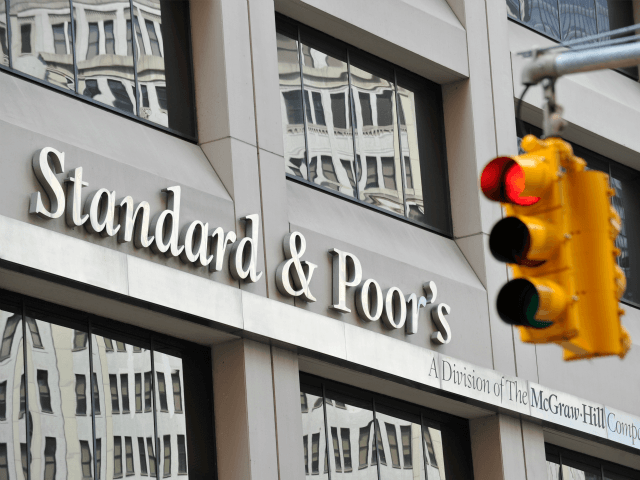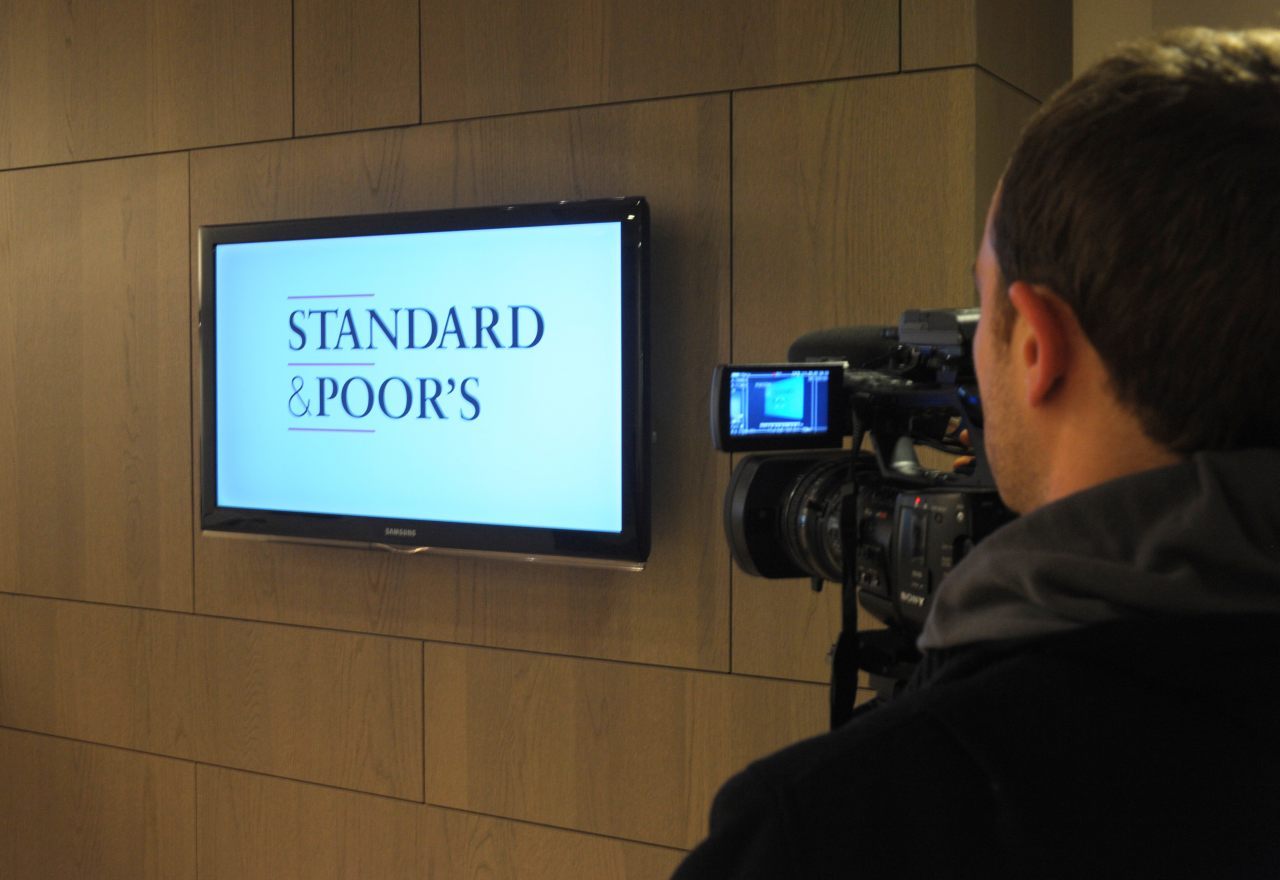On Friday, Standard & Poors (S&P), the largest of the “big three” credit rating agencies, downgraded Poland as a sovereign credit from A- to BBB+. This is the first ratings change for Poland since 2007 and first actual downgrade in Polish history. The new rating is the lowest rating above “non-investment” grade status which, if lowered one more level would make Polish debt un-investable for a large portion of the world’s money managers, insurance companies, annuities, and pension plans.
If this lower rating is assigned the liquidity available to the government would be reduced thus forcing Poland to borrow at significantly higher interest rates. As it stands, this downgrade will lead to higher borrowing costs for the Polish treasury in global markets as risks are perceived to have increased due to this ratings change. I contend this was not driven by economic realities but merely by political considerations of a politicised corporate entity taking its cue from a hyper politicised European Union that desires to punish Poland for falling out of line with its previous, scandal plagued government’s Eurocentrism.
This new rating is indicative of an obligor that has adequate capacity to meet its financial obligations but one that the ratings agencies perceive has a higher probability of seeing adverse economic conditions developing in the intermediate future. S&P suggests there is a one-in-three probability of a further downgrade over the next 24 months if a reversal of policy is not undertaken.
In October S&P reaffirmed their positive outlook for Poland, suggesting that if election promises like a lowered retirement age and stipends for parents saw follow-through, and expenditures were increased without offsetting revenues raised, then a revised outlook from “positive” to “stable” could be in order in the future, but they didn’t hint at impending downgrades nor delineate what would trigger one (suggesting that it was not even on their radar at that time). But they’ve done it anyway.
It is not possible that this move was grounded in economic analysis as GDP projections have not deviated materially since the election, the economy has not deteriorated at all, and inflation is trending modestly upward which is a healthy sign and proof that there is no deflation in the economy (unlike in other, larger, EU economies). Moreover, only a few months ago (Sept 30th) Marcin Petrykowski, S&P’s Warsaw based Managing Director in charge of the Central and Eastern European region, was raving about the fundamentals of the Polish economy which he saw as ideally positioned for the intermediate and long term and containing a hybrid, “best of both world’s” dynamic of mature, developed European economic stability yet also possessing the growth prospects of an emerging and developing economy. S&P had strengthened their outlook on Poland from “stable” to “positive” in February 2015 and suggested there might be an upgrade coming in the intermediate term. Petrykowski stated in this September interview “Poland is in a good moment is what we are telling investors.”
The only time such drastic economic revisionism occurs is when there is a major geopolitical event such as a coup (not merely the rhetorical allusion to one such as what has been emanating from the EU technocracy). Mr. Petrykowski said in an interview on December 4th last year as analysts tend to provide guidance on their perspectives so as not to spook the markets with low visibility surprises, that: “Despite the change of power fundamentals of the Polish economy remain stable.” All of these data points further suggest that this was a politically motivated ratings downgrade.
Poland’s rating of A-, with its accompanying positive outlook, has been maintained for many years as a reflection of its low relative debt and consistent GDP growth that has seen not a single quarterly contraction since coming out of Communism in 1989. This is a unique and impressive dynamic. Poland weathered the global crisis during 2008-9 and the Greek-driven European crisis from 2010-12 exceedingly well with its flexible exchange rate and labor force and relatively unlevered sovereign, banking sector, and consumer balance sheets. During these previous crises many European economies, both developed and emerging, saw periods of negative growth and recession. Poland was the only EU nation that did not experience any negative quarterly GDP prints and at no point entered recession.
During this period Hungary experienced a political shift that led to economic instability and a downgrade to BB+ which is three further notches below Poland’s new rating. Hungary currently holds a rating that is considered “speculative” and is referred to colloquially as “junk” due to its higher perceived risk of default and reduced investor base. Its outlook is stable, which suggests that rating will not be changing anytime soon. By enacting this downgrade on Poland as a sovereign credit, S&P is firmly suggesting that there is now a higher likelihood of the proverbial “storm rolling in on the horizon” and that negative economic outcomes will manifest as a result of political considerations, as it did with Hungary. Theoretically, this prognostication by S&P is suggestive that Poland’s ability to make payments in this intermediate future time period could become impaired.
What is so odd about this Polish downgrade is both the timing and manner in which it came about. Usually when a rating of this threshold is changed from “investment grade” with a “positive outlook” down to one notch above “non-investment grade” with a fully reversed outlook to “negative” a sovereign borrower and the global investor class lending the sovereign capital would see a warning issued before this rating change is executed. This would be termed being placed on “credit watch” or “negative watch” and the outlook would be revised from “positive” or “stable” to “negative” before the change. As these ratings changes directly affect borrowing costs this gives the sovereign an opportunity to reverse course in its fiscal or monetary policy and its political and legislative behaviour. This warning was not given to Poland. Again, this begs the question: why?
The rationale that S&P offered was that “Poland’s new government has initiated various legislative measures that we consider weaken the independence and effectiveness of key institutions.”
Of course in theory this could have derivative economic implications, but this certainly has not been borne out and thus one would think at most there might be a change in outlook before a downgrade which at this stage seems more than a little unusual. This rationale offered by S&P reads like it might have been uttered by EU apparatchiks like Martin Schulz, Frans Timmermans, or Gunther Oettinger; three vociferous critics of the recent Polish government’s politics, policy, rhetoric, and as of last week, legislation.
Also seemingly more than a little coincidental is that this is came just 48 hours after Brussels’ evident failure in invoking the Article 7 mechanism that has been threatened to punish Poland for falling out of line, in the EU viewpoint, with “shared European values” (yes, they actually use those words).
The example cited by both the EU and S&P relates to Poland’s new media law which gives the Polish government more control over the public sector media that is paid for by the Polish taxpayer. This normalising of control has been deemed “censorship” by the Eurocrats and the Western press. Most Poles recognise it is not ushering in an era of a restricted press, but rather that for the last eight years there have scarcely been anti-EU viewpoints in public media. It’s scarcely different than the British Prime Minister appointing his preferred people to the House of Lords.
Secondarily cited by both the EU and S&P is Poland’s recent reform to its uber-crooked judiciary, the Constitutional Tribunal, which was previously stacked by the last ruling coalition government (PO/PSL). An Article 7 enforcement action, which would see the recipient lose its voting rights in the European Council, was created to punish those who stray from shared “European values” (whatever the hell that means). Given the epic Lisbon Treaty debacle, it seems like quite the cop-out from a group that has never demonstrated any real consistent democratic values.
Article 7 has never been invoked before now, and was only written into EU statutory law in reaction to Brussels failure to curb Hungary’s “illiberal” (Brussels verbiage) shift to the right after the Viktor Orban election.
This would not be the first time that S&P’s integrity is called into question with regard to currying favour with its rating changes. On Wall Street it has been commonly accepted for years that many of their actions are driven by political considerations. If you’ve seen the new Brad Pitt movie, The Big Short, you’ll know what I mean. Take this exchange from halfway through the movie, when the analysts at Frontpoint realise why S&P isn’t downgrading junk mortgage bonds:
Mark Baum: Have you ever refused to rate these bonds… AAA?
Georgia Hale: I’m under no obligation to share that information with you.
Baum: Can you name one time in the last year… you didn’t give the banks the AAA they wanted?
Hale: If we don’t give them the ratings they’ll go to Moodys. Right down the block. If we don’t work with them they will go to our competitors. Not our fault, simply the way the world works. Now you see.
Vinnie Daniel: Holy shit. They’re selling ratings for fees.
S&P was the largest and most complicit in the now proven fraud and was made to pay out a record settlement $1.3bn fine. The characters refer to the ratings agencies as “whores”.
In Europe, in real life, this was never more evident than during the multiple Greek crises from 2010-12 and the frequent ratings changes that catalysed Troika (EU, ECB, IMF) intervention and mandatory negotiations.
In April 2010 a downgrade of Greek debt to “junk” forced the country to negotiate a rescue plan which put Greece under control of these external financing parties. The crisis was far from solved and more ratings actions by S&P forced Greece back to the table. Each time they had to cede more of the country’s sovereign decision making capacity to “global finance”. These rating changes were used to keep Greece at the mercy of its creditors and prevent it from restructuring in the manner which would have saved the Greek people from socially crippling austerity in favour of the predominantly German banking interests.
Given the preponderance of evidence of deep political engagement by S&P it is clear that they have behaved frequently as a tool of Washington and Brussels. This further lends credence to the theory that the Polish downgrade was exercised at the behest of an EU that wanted to punish Poland.
Poland did not receive the logical, market-driven courtesy of an outlook change that may have allowed them to take action. In short, the EU and the S&P are intentionally creating economic problems for Poland. Is this the Union that Briton’s should vote to remain members of in their membership referendum this year? I would suggest not. But it may well be used by the PiS to further galvanise Polish intransigence against the European Union. Suddenly “ever closer union” looks shaky on the back of EU brinkmanship.
It is important to note that Fitch, the third largest rating agency (Moody’s is #2 to S&P’s #1), reaffirmed its A- rating and maintained its stable outlook on Poland. Fitch is perhaps the least politicised agency. And neither the World Bank nor the IMF have sounded the alarm.
Citibank, with one of the most widely respected global macro research desks focusing on FICC (fixed income, currencies, and commodities) on Wall Street put out a research note shortly after the downgrade expressing shock and surprise at the action. They viewed the S&P rating change as “harsher than expected” and would not have felt that way with merely an outlook change that would have allowed economic data to be actualised before taking action that would spike borrowing costs for a democratic sovereign.
Thirdly, and most tellingly, the Minister of Finance (Pawel Szalamacha) stated after the downgrade that he was not approached to discuss S&P’s economic assumptions, which given the magnitude of S&P’s formal sentiment shift was more than a little odd. However, according to respected financial reporter Wojtek Surmacz, S&P did speak to two high profile Polish public sphere economists unofficially; Mateusz Szczurek and Ryszard Petru. Szczurek was the last Minister of Finance under the recently vanquished government and now opposition party, Civic Platform (PO). Petru is the leader and founder of a new opposition party Nowoczesna (NPL), and a particularly self-serving economist with a horrible track record in economics and an even worse track record in integrity who has been trying to claw his way into a political position saying whatever he thinks will gain him support.
Unfortunately the punishment Brussels has meted out will lead to higher borrowing costs for the nation and its citizens and will have direct negative impact on the Polish economy. Poland will have less capital to invest in Poland for Poland and its citizenry. This capital that will now go to fund higher borrowing costs would have been useful for infrastructure development or social welfare or any one of many other initiatives that the growing Polish democracy is eager to engage to see its economy further develop. An unfortunate potential result from the higher financing costs may also be higher deficits, if revenues cannot be raised, which in turn will attract less FDI (foreign direct investment) as well.
So Brussels has just proven that they are willing to engage in economic warfare and concerted efforts at GDP destruction against the citizens of free nations and democratically elected governments as punishment for not following their political mandates. If this is not technocratic tyranny I do not know what it is. Davos begins this week and the Eurocrats will no doubt be patting themselves on the back for a job well-done in keeping those pesky Poles, with their free elections, in check. All this while the EU elite dine on champagne and caviar… all at your expense of course.
Follow the Poland developments on Twitter at @MatthewTyrmand





COMMENTS
Please let us know if you're having issues with commenting.